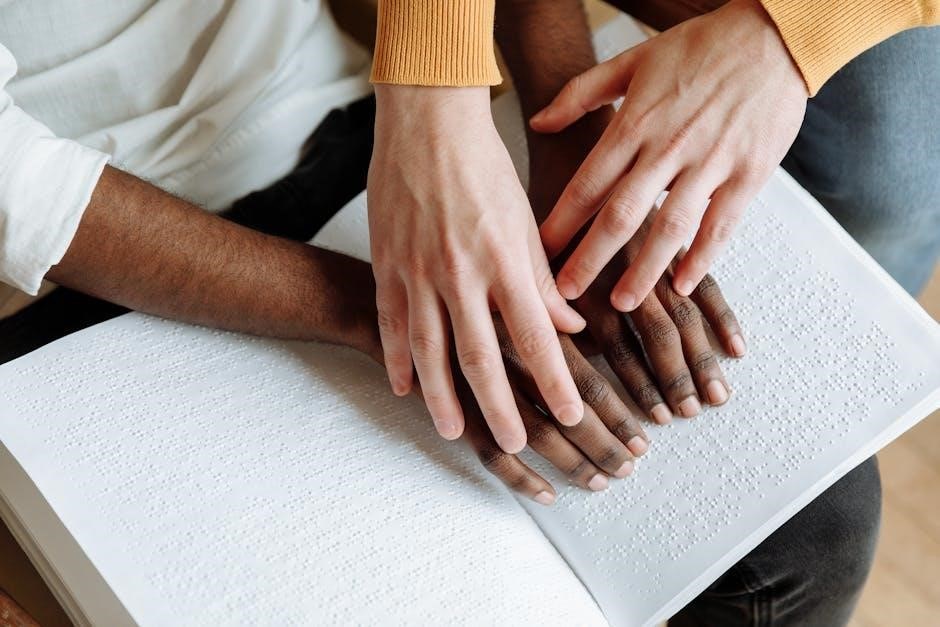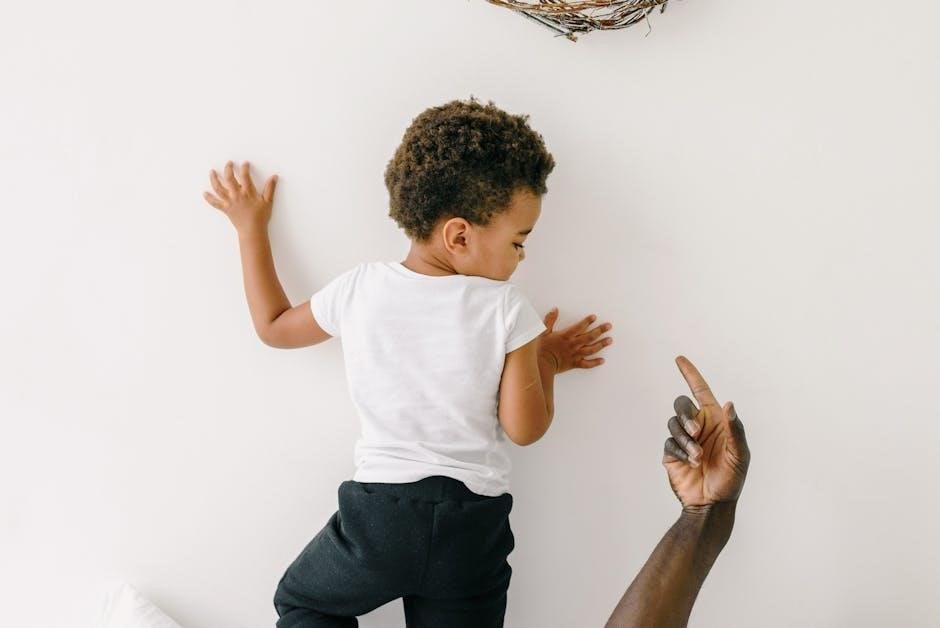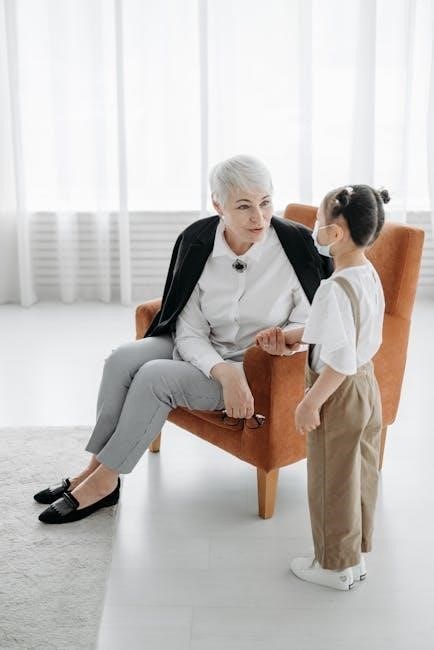
the blackman’s guide to understanding the blackwoman
Exploring the complexities of Black women’s experiences, this guide delves into historical journeys, communication dynamics, and societal challenges, fostering unity and empowerment through mutual understanding.
Historical Context: The Legacy of Slavery and Its Impact on Black Relationships
The legacy of slavery profoundly disrupted Black relationships, fostering dysfunction rooted in systemic oppression. Historical trauma reshaped dynamics, creating power imbalances and cultural narratives that persists today. Slavery’s aftermath imposed racial hierarchies, affecting trust and communication between Black men and women. This historical pain continues to influence modern interactions, highlighting the need for understanding and healing to rebuild connections and challenge harmful stereotypes. Recognizing this legacy is crucial for fostering unity and resilience in Black relationships.
The Importance of Communication in Building Bridges
Effective communication is vital in bridging gaps between Black men and women, fostering understanding and empathy. Open dialogue helps address misunderstandings, break down barriers, and rebuild trust. By actively listening and expressing feelings honestly, both partners can navigate historical and societal challenges. Communication fosters mutual respect, challenging stereotypes and promoting unity. It encourages vulnerability, creating space for healing and growth. Through meaningful conversations, Black relationships can strengthen, overcoming past traumas and embracing a future rooted in collaboration and shared goals.
The Black Woman’s Perspective: Challenges and Strengths
Black women face intersectional challenges of racism and sexism, impacting mental health, yet their resilience and strength empower them to thrive and inspire change in their communities.
Intersectional Challenges: Racism, Sexism, and Mental Health
Black women face unique struggles at the intersection of racism and sexism, leading to mental health challenges such as anxiety and depression. Systemic oppression and societal stereotypes exacerbate these issues, creating a cycle of emotional and psychological strain. The historical trauma of slavery and ongoing discrimination contribute to feelings of isolation and resilience fatigue. Acknowledging these intersectional challenges is crucial for fostering understanding and promoting healing within Black communities, ensuring Black women receive the support they deserve to thrive.
Resilience and Empowerment: The Strength of the Black Woman
Black women embody remarkable resilience, navigating systemic oppression with grace and determination. Their ability to transform adversity into opportunity is a testament to their strength. Through education, career success, and community leadership, they redefine societal expectations, inspiring future generations. This empowerment is rooted in cultural pride and a collective effort to uplift one another, creating a legacy of unwavering fortitude and hope. Their journey from survival to thriving is a powerful narrative of triumph and enduring spirit.
The Black Man’s Role: Responsibilities and Misconceptions
Black men are key allies in fostering equality and understanding, challenging stereotypes and supporting Black women’s empowerment while addressing historical and cultural misconceptions.
Debunking Stereotypes: The Myth of Black Male Superiority
The notion of Black male superiority is a harmful stereotype rooted in historical oppression and societal conditioning. It fosters division and ignores the shared struggles of racism and systemic inequality. Such narratives, often perpetuated by figures like Shahrazad Ali, suggest dominance over Black women, perpetuating cycles of conflict. True strength lies in mutual respect and collaboration, not in outdated hierarchies. By challenging these myths, Black men and women can build partnerships rooted in equality and understanding.
Understanding Emotional Expression and Support
Emotional expression and support are vital in fostering healthy relationships. Black men must recognize the importance of active listening and empathy in understanding Black women’s experiences. Historical trauma and societal pressures often shape emotional responses, requiring patience and validation. By creating safe spaces for open dialogue, both partners can navigate challenges together, strengthening their bond. Mutual support fosters resilience, helping to heal generational wounds and build trust. This understanding is key to fostering a nurturing and equitable partnership.
Generational Trauma and Its Effects
Generational trauma stems from the legacy of slavery and systemic oppression, manifesting as deep-seated pain that often resurfaces in relationships and communication.
How Slavery and Systemic Oppression Shape Relationships
Slavery and systemic oppression left a lasting imprint on Black relationships, fostering mistrust and communication barriers. Historical trauma created power imbalances, affecting emotional connections and mutual understanding. The legacy of forced separation and dehumanization continues to influence dynamics, often manifesting in unresolved anger or detachment. These deeply rooted issues highlight the need for acknowledgment and healing to rebuild trust and foster healthier partnerships, emphasizing the importance of addressing the past to move forward collectively.
Breaking Cycles: The Power of Forgiveness and Healing
Acknowledging the past is crucial for healing. Forgiveness releases emotional burdens, enabling Black men and women to confront historical wounds collectively. Open dialogue fosters understanding, dismantling cycles of dysfunction rooted in systemic oppression. Healing requires vulnerability and empathy, creating space for trust and unity. By addressing unresolved pain, Black relationships can evolve, breaking free from generational trauma. This process fosters resilience and strength, paving the way for healthier, more fulfilling partnerships grounded in mutual respect and shared growth.

Financial Independence and Power Dynamics
Black women’s rise in economic power challenges traditional dynamics, fostering independence and reshaping relationships. Collaboration, not competition, strengthens partnerships, promoting mutual respect and understanding in modern Black relationships.
The Black Woman’s Rise in Economic Power
The Black woman’s increasing economic influence challenges traditional power dynamics, fostering independence and equality. Despite systemic barriers, her rise is driven by education, entrepreneurship, and resilience. This shift not only empowers individuals but also strengthens communities, encouraging partnerships rooted in mutual respect. By embracing financial autonomy, Black women redefine roles, inspiring future generations and promoting a culture of shared success and understanding in relationships.
Balancing Roles: Partnership vs. Competition
Navigating shifting dynamics, Black women and men must redefine roles to foster collaboration over competition. Financial independence and shared responsibilities create opportunities for mutual respect and equality. By embracing partnership, both parties can move beyond traditional expectations, fostering a relationship built on trust and teamwork. This balance is crucial for strengthening bonds and dismantling outdated power structures, ensuring both individuals thrive together in harmony and understanding.
Parenting and Family Values
Black women often embody strength and resilience, fostering cultural values and community support. Their nurturing environments cultivate resilience and self-worth in children, guiding future generations with care.
The Influence of Upbringing on Relationship Expectations
Black women’s upbringing often shapes their relationship expectations, influenced by cultural values, family dynamics, and generational lessons. Traditional roles, communication styles, and trust-building are deeply rooted in these experiences. Historical context, such as the legacy of slavery and systemic oppression, further molds expectations, emphasizing resilience and mutual support. Understanding these influences is crucial for fostering harmony and aligning relationship goals, ensuring both partners honor their shared heritage while navigating modern complexities together.
Shared Responsibilities in Raising Future Generations
Raising future generations requires a collaborative effort, blending cultural values with modern realities. Black women often emphasize the importance of mutual respect and teamwork in parenting, fostering a sense of unity and shared purpose. Historical contexts, such as the impact of slavery and systemic oppression, highlight the need for both partners to contribute equally to a child’s emotional, educational, and financial well-being. By embracing these shared responsibilities, Black couples can create a nurturing environment that honors their heritage while preparing children for future challenges.
The Impact of Societal Portrayals
Societal portrayals often shape perceptions, influencing how Black women and men view themselves and each other, creating misunderstandings rooted in external narratives rather than authentic connection.
Media Representation: The Black Woman in Society
Media often portrays Black women through limited, stereotypical lenses, reinforcing narratives of strength or dysfunction. These portrayals shape societal perceptions, influencing how Black men and women view themselves and each other. Such representations can perpetuate misunderstandings and contribute to internalized biases. It is crucial to critically analyze these depictions and advocate for authentic, diverse storytelling that reflects the full complexity of Black women’s experiences and challenges harmful stereotypes.
Overcoming External Narratives About Black Relationships
External narratives often portray Black relationships through a lens of dysfunction, shaped by historical oppression and societal biases. These depictions can foster misunderstandings and division. To overcome them, it’s essential to challenge stereotypes and embrace open, honest communication. By valuing mutual respect and collaboration, Black men and women can redefine their relationships on their own terms, moving beyond external expectations and fostering a deeper understanding of each other’s experiences and strengths. Unity and empathy are key to breaking these cycles.

Conflict Resolution and Healthy Arguments
Effective communication and emotional intelligence are crucial in resolving conflicts. Active listening, empathy, and mutual respect foster healthier arguments, strengthening relationships and understanding between partners.
Effective Communication Strategies
Active listening and empathy are vital in fostering understanding between Black men and women. Clarifying emotions and avoiding assumptions help bridge communication gaps. Open dialogue encourages honesty, reducing misunderstandings. Expressing needs clearly and respectfully fosters mutual respect. Avoiding defensive tones and focusing on solutions strengthens connections. Validating each other’s experiences builds trust and unity. These strategies create a foundation for healthier interactions, empowering both partners to navigate challenges together. Effective communication is key to fostering understanding and unity in Black relationships.
Learning to Listen and Understand Each Other
Listening without judgment is crucial for fostering understanding. Acknowledging each other’s perspectives helps bridge gaps. Empathy allows for deeper connections, validating experiences shaped by history and culture. Active listening involves more than hearing words—it requires absorbing emotions and intent. Patience and humility are essential in navigating differences. By truly understanding each other, Black men and women can move beyond defenses and build trust. This mutual effort fosters unity and strengthens relationships, paving the way for healing and growth together.

Intimacy and Trust
Building emotional and physical connections, fostering mutual respect, and establishing trust are vital for intimacy. These elements strengthen the bond between Black men and women.
Building Emotional and Physical Connection
Emotional and physical connection is fostered through open dialogue, empathy, and mutual respect. Trust and vulnerability create a foundation for intimacy, while shared experiences strengthen bonding. Affectionate gestures and understanding each other’s needs enhance closeness. Historical contexts, such as the legacy of slavery, can impact emotional availability, making intentional efforts to reconnect crucial. Prioritizing quality time and communication helps bridge gaps, nurturing a deeper, more meaningful relationship built on trust, respect, and shared growth.
Maintaining Trust in a Relationship
Maintaining trust requires transparency, accountability, and consistent actions that align with words. Open communication fosters reliability, while mutual respect and empathy strengthen bonds. Acknowledging past hurts and working through them collectively builds resilience. Trust is fragile and requires effort to sustain, particularly in contexts where historical and societal challenges may have eroded it. Consistency in actions and words, alongside a willingness to grow together, ensures a stable foundation for trust to flourish and endure in Black relationships.

The Future of Black Relationships
The future of Black relationships lies in unity, healing, and mutual empowerment, fostering a culture of love, respect, and collaboration to build a stronger, unified community together.
Modern Movements: Black Love and Feminism
Modern movements emphasize Black love and feminism as powerful tools for empowerment. Black love fosters unity, while feminism advocates for equality and challenges systemic oppression. These movements encourage open dialogue, mutual respect, and collaboration, promoting healing and growth. By embracing these ideals, Black relationships can thrive, breaking cycles of dysfunction and building stronger, healthier partnerships. The focus is on cultural pride, self-love, and collective progress, paving the way for a brighter, more resilient future for Black communities.
Creating a Unified Vision for the Future
Building a unified vision for the future requires collaboration and mutual understanding. By addressing historical wounds and fostering open dialogue, Black men and women can create a shared path forward. This vision emphasizes partnership, equality, and collective empowerment. It encourages breaking down barriers and embracing each other’s strengths. Through unity, the Black community can overcome systemic challenges and build a future rooted in love, respect, and resilience, ensuring a brighter tomorrow for generations to come.